University Award for Innovative Civic Engagement
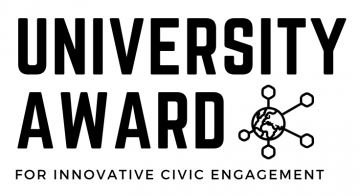
In 2020, the Talloires Network, supported by a grant from the Open Society Foundations, launched the University Award for Innovative Civic Engagement to discover novel research and learning strategies for university civic engagement among Talloires Network member universities. The award provided direct support for the local expansion of civic engagement partnerships to build more equal and inclusive societies. The selected universities in Cameroon, Kenya, Mexico, Cameroon, and Nicaragua, each received a grant award (up to 20,000 USD) and led a session together during the Talloires Network Leaders Conference at the virtual campuses of Tufts University and Harvard University, on 30 September – 3 October 2021.
Now, over a year later, the universities have met regularly to share their experiences, challenges, and lessons learned. Their collaboration forged new relationships and networks, and culminated in a presentation during TNLC2021. Read more about the Award winners and their projects funded by the University Award, along with their journeys from the onset of COVID-19 to January 2022, below.
See the press release announcing the winners: “Talloires Network Awards Grants to Five International University-Community Partnerships”
Read more about each award winner:
Kenya: Co-creation Strategies for Improving the Health of Children and Access to Safe Water in a Time of Crisis
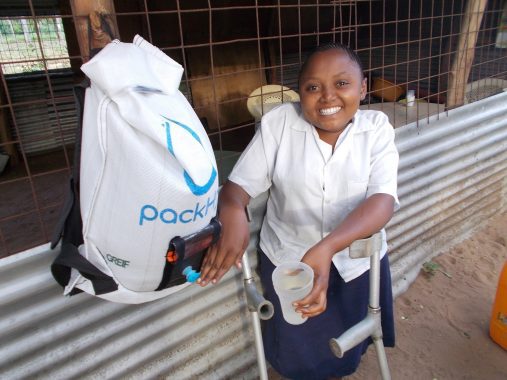
Student taking water from the water backpack, Mount Kenya University and Partners for Care collaboration, 2020.
Mount Kenya University (MKU), in partnership with the Partners for Care, has implemented highly impactful interventions in rural East Africa to improve the quality of water and sanitation services. In an effort to prevent the spread of waterborne illnesses including Tunga penetrans, a parasitic insect commonly referred to as jiggers, the project installed water backpacks to areas lacking access to clean water, set up hand-washing stations, and local clinics to treat jiggers.
Dr. Peter Kirira of MKU notes that, “41 percent of Kenyans lack access to basic sanitation solutions.” Populations in rural areas are often unable to reach piped water infrastructure, leading to waterborne disease and parasites. Dr. Kirira describes the significant issue of jiggers, noting, “It is reported that over 2 million people are infested by jiggers…In 2020, there were about 37,523 cases of jigger infestation recorded in health facilities across the country.” Compounding this, the COVID-19 pandemic has also “paralyzed service delivery [in the health sector] due to overstretched health facilities especially in the HDU and ICU units.”
The MKU partnership with Partners for Care has made incredible strides in addressing inadequate access to water sanitation resources and health services. The health care team successfully eradicated jiggers from 26 primary schools, treated 3,542 people for jigger infestation, and trained 593 families on jigger prevention and control techniques. Additionally, the partnership distributed “over 5,000 water backpacks as hand-wash units to prevent the spread of COVID-19” and “1,000 water backpacks in 66 special needs and primary schools in Laikipia County.”
The partnership faces challenges such as access to financial support and student participation. However, through strategies such as “increased systematic engagement with vulnerable groups” and strengthened relationships with communities and local government, the project has reached key populations and sustained their work. Dr. Kirira emphasized the importance of the University Award Community of Practice, noting, “sharing ideas, experiences and strategies are important building blocks in establishing a community of practice through identifying the best approach within the local context.” One of the many valuable insights gained through the program has been the power of mainstreaming civic engagement activities within institutions.
Cameroon: Health Care for Internally Displaced Persons in Cameroon to Mitigate the Impacts of COVID-19
The partnership between Meridian Global University (MGU) and Access Care Foundation addresses urgent healthcare needs in areas that have been affected by Cameroon’s five-year long armed conflict in the Anglophone Region. The project employs MGU health students and Access Care Clinic staff to provide home-to-home community services such as education on proper hygiene and sanitation, mass distributions of long-lasting insecticidal nets, and malaria prophylaxis to pregnant women, and many other free health services such as screenings, testing, and treatments of common diseases.
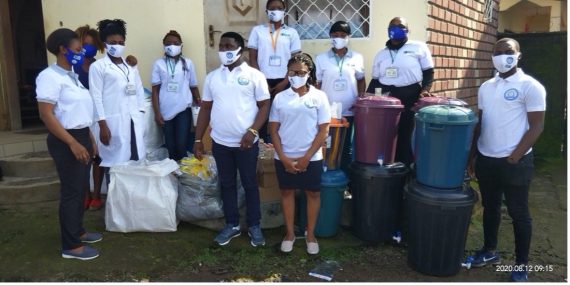
Face Masks, Sanitizers and Washing Stations Ready for Distribution, Meridian Global University and Access Care Foundation partnership, 2020.
The project’s primary challenges have been the many barriers to accessing those in need of urgent medical care, including COVID-19 restrictions and the Anglophone Crisis. Armed conflict between separatist fights and the government has resulted in population displacement, leading to poor hygienic circumstances that perpetuate various diseases such as malaria, diarrheas, and respiratory tract infections. This issue is further exacerbated by COVID-19. Dr. Elvis Akomoneh of MKU noted, “The precarious living conditions in bushes or slums are characterized by overcrowding, poor sanitation and lack of good water supply.” Accessibility is further made difficult due to distrust of health care professionals amid the divisive political turmoil and regular lockdowns that prohibit movement.
Fortunately, the project has seen tremendous successes. Dr. Akomoneh describes the positive results of the partnership: “We currently observe a more than 70% reduction in the number of cases of malaria related hospitalizations within the population, less than 1% of pregnant women with malaria and 0% malaria related miscarriages.” Additionally, the project has observed a 90% reduction in cases of unwanted pregnancy and “less than 5% incidence of COVID-19 infections within the target population in the last three months.”
MGU developed strong community partners with similar objectives across a wide variety of sectors including non-profits, government, and local community-based organizations. Dr. Akomoneh also highlights the impact of the University Award community of practice, emphasizing the exposure to different perspectives and challenges and incorporating lessons learned from their colleagues into their own methods.
Mexico: Food Security & Health Promotion Initiatives During the COVID-19 Crisis
In Veracruz state, Mexico, Universidad Veracruzana (UV) worked in partnership with the Veracruz State Department of the Environment, local communities, and indigenous youth to create food security projects throughout the region to address the pressing needs of the community.
Indigenous communities make up 15% of the Veracruz population, and many are in rural locations lacking access to health services, cellular coverage, and internet. Furthermore, “58.6% of the Veracruz population are living in poverty and 24.4% lack access to healthy food,” resulting in issues such as malnutrition and obesity. With the restrictions and closures of many marketplaces due to COVID-19, these issues were heightened. Miguel Escalona and Cliona Maher, of UV, note that the pandemic brought to light “that there are many inequities and injustices around being able to acquire basic goods for a decent quality of life.”
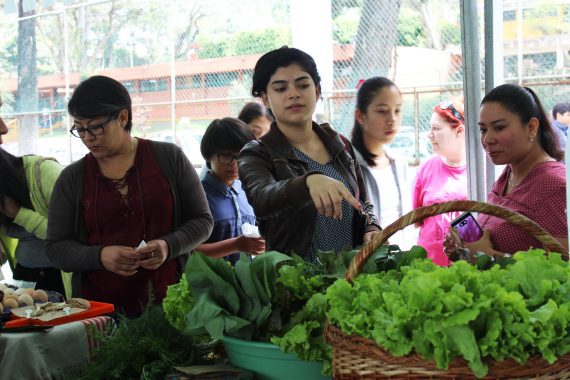
Customers at the Agroecological Market, Universidad Veracruzana partnership with Veracruz State Department of the Environment, 2020.
The UV partnership addressed these issues by creating communities of learning to increase local food production, strengthen local economies and empower communities to take on the issue of food insecurity by providing education and resources. They set up educational Support Groups for Production at Home, community seed exchange events, and opened an Agroecological Market or Tianguis Agroecologico Xalapa. They also worked with local communities to strengthen their digital literacy and helped producers create online communications campaigns to advertise their markets.
UV students provide trainings, workshops, and share their experience and skills to make change in the local communities they serve. The project also emphasized the “recognition and visibility of solidarity economy practices, and the empowerment of women, recognizing them as key elements for a paradigm shift in the family and in the economy.”
The UV partners with various government agencies to “support local food production initiatives to reactivate the local economy and promote the empowerment of local actors to maintain these processes over time.” Escalona and Maher describe the evolving role for universities, noting that “it is necessary to dialogue, build community links, and develop participatory action-research processes that generate new knowledge and new practices.” They also described the importance of sharing experiences and approaches with international communities of practice and hope to continue to support and develop these relationships.
Nicaragua: Biopsychosocial Strengthening of the University Community and its Environment Against COVID-19
The National Autonomous University of Nicaragua (UNAN) Managua, in partnership with the Ministry of Health, municipal mayors, and non-profit institutions aimed to address the promote awareness of mental health during the COVID-19 pandemic. In the cultural context, traditional education has not emphasized the importance of mental health and “members of this community still show prejudices and myths that limit the attention to these issues.” The partnership worked with local communities and primary and secondary schools in the Managua area, identifying problem areas such as addiction, domestic violence, lack of familial support, and poor emotional competency. The COVID-19 crisis has further exacerbated these issues, and brought with it significant psychological impacts, along with increases in promoting “false news” surrounding the virus.
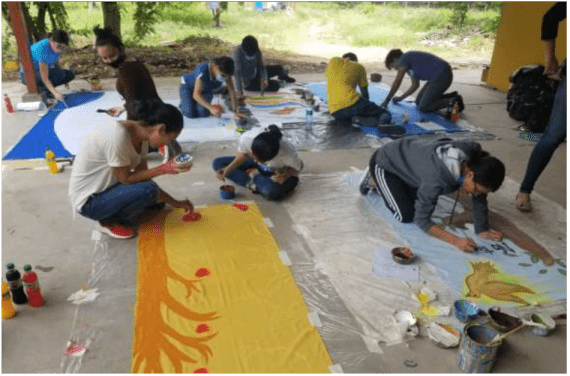
Painting activity at local school. UNAN Managua partnership with the Ministry of Health, 2020.
The UNAN project worked to strengthen “personal, group, and community emotional capacities to face daily life in this new context.” They created campaigns such as the “Emotional Backpacks” initiative to spread awareness of emotional health and to provide informational resources surrounding the COVID-19 pandemic. They also worked with children, adolescents, and teachers to promote physical activities that strengthen emotional and physical health such as walks, games, and fairs. The focus on physical health has been integral in promoting biopsychosocial wellbeing in the community during the pandemic.
Miurell Suárez and Leana Lanuza of the UNAN partnership noted, “The university plays an important role in the development of the university community and its environment as an institution…to make visible a reality in the face of the social, emotional, physical, cultural, economic and political aftermath that COVID-19 continues to leave.” The project identified helpful common frameworks within the Community of Practice with other University Award winners such as social and solidarity economies, and forming relationships with not only local, but international partners.
Zimbabwe: Combating COVID-19 Through Digital Innovation and a Community-Driven Approach
The University of Zimbabwe, through the paNhari Program, partnered with Simbiso Jumpstart and a local Community Cooperate to tackle the devastating impact of COVID-19 on local vendors in Zimbabwe’s Harare Province, where the economy is primarily informal. paNhari Co-Founders Phil Mlanda and Donald Bodzo noted, “Overreliance on the informal sector rendered Zimbabwe’s economy vulnerable to a number of shocks and stresses,” and the number of citizens in poverty “rose to 7.9 million in 2020 due to the COVID-19 pandemic.” The goal of the partnership was to safeguard the livelihoods of vulnerable populations and create resources for economic recovery and resilience. The project promoted “employment creation and income generation by providing entrepreneurship education and established a revolving loan facility for the vulnerable Small-to-Medium Enterprises (SMEs) and entrepreneurs in Mabvuku,” a suburb of Harare.
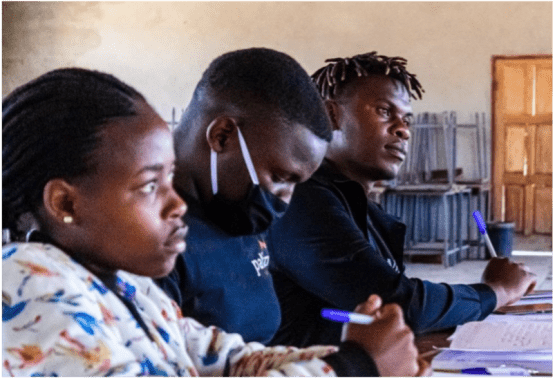
Brainstorming session to explore new strategies for combating impacts of COVID-19 on impacted small businesses, University of Zimbabwe partnership with Simbiso Jumpstart, 2020.
University of Zimbabwe students worked with partners to create a digital platform that was able to identify and visual impacts of COVID-19 on the Harare Province to mobilize and deploy assistance. Using aggregate inputs from community members gathered through social media, they “created a digital map that provided up-to-date information to the University of Zimbabwe for purposes of effectively deploying resources to the affected communities and conducting COVID-19 sensitization and awareness campaigns.” They solicited applications from SMEs and received over 350 submissions in a period of three weeks. The project assessed the needs of the SMEs and provided entrepreneurial education and a revolving loan facility, which provided low-interest, short term loans to address immediate liquidity-shortages.
The University of Zimbabwe’s partnership approach is based in the belief that collaboration with local community partners leads to more successful problem-solving, and the paNhari program urges higher education institutions to continue forging alliances with their communities. Mlanda and Bodzo emphasized that, “higher learning tertiary institutions need to renew focus, prioritize inclusivity, re-up university commitments to working effectively with community partners, the private sector, and other bodies to develop closer working relationships.” Through their partnership with local organizations as well as through the Community of Practice with University Award winners, the initiative was able to work more effectively and share knowledge that benefited all collaborators. They noted that “The current global pandemic has reminded us of our interdependence and the importance of establishing deep connections with each other.”